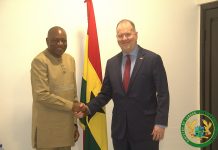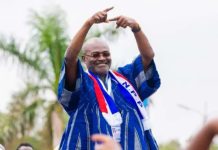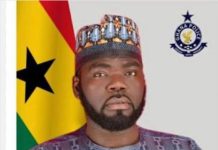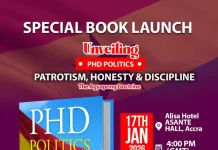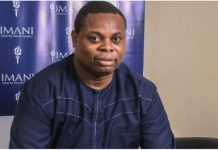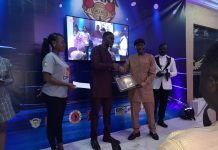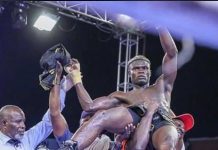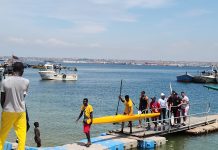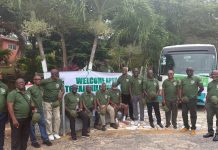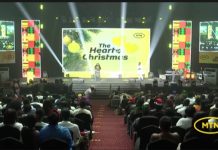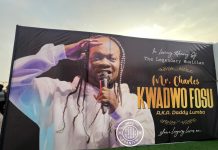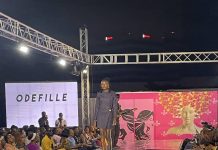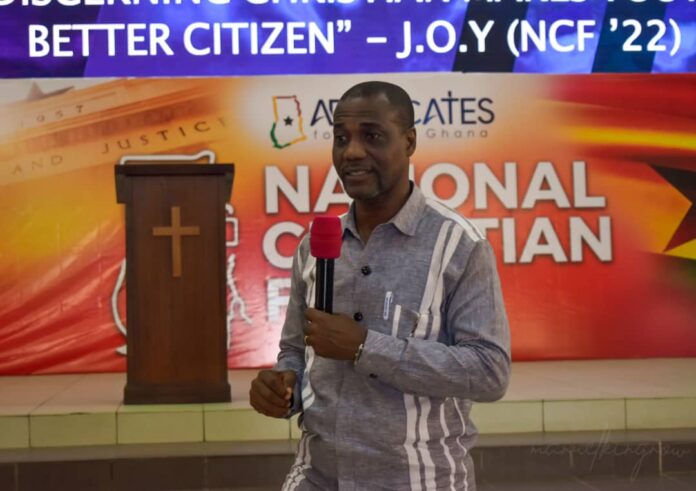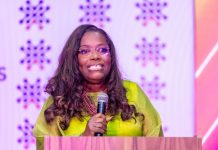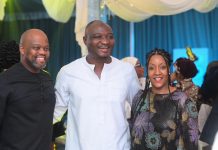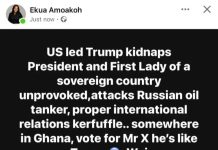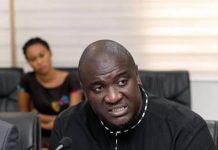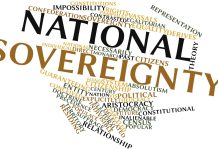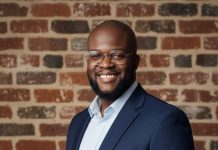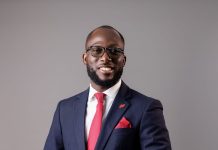SPEECH DELIVERED BY JACOB OSEI YEBOAH
2012-2016 NON-PARTISAN
PRESIDENTIAL CANDIDATE
VENUE: LEGON INTERDENOMINATIONAL CHURCH
HELD ON 27TH AUGUST 2022
Mr. Edem Senanu, President of Advocates For Christ Ghana (A4CG), Distinguished Panel Speakers, Councils and Catholic Bishops Conference, Church Leaders, All manifesting Children of God that creation has been waiting for (Discerning Christians), Ladies and Gentlemen, all other protocols duly observed.
I’d like to thank the organisers of 2022 National Christian Forum (NCF), A4CG, for inviting me to talk on the topic “Ghana@65: Assessing the Executive Arm of Government in Promoting Good Governance.” My talk will focus on what has worked, what hasn’t, and what we should do next.
First, I’m addressing Christians in Ghana, therefore I should be qualified to appraise them as a Christian myself. Second, as a politician anointed in the Ministry of Royal (NOT HOLY Priesthood) Priesthood like the biblical Daniel, to search through history of how the Executive Arm of Government, which is the leadership among the three arms of government (Executive, Legislature, Judiciary), has influenced good governance in Ghana, especially the last 65 years since independence.
The late Dr. Kofi Annan, Ghana’s distinguished son and former UN Secretary General, said, “To live is to choose. But to choose, you must know (first understand) WHO YOU ARE, what you stand for, where you want to go, and why you want to get there.” Indeed, we cannot agree more to the late Kofi Annan, for the choice should not only be by discerning Christian citizens and their value system, their vision in life, but should also bring meaning and life to Ghana.
Twelve (12) Presidents, Heads of State, and Revolutionary Leaders guided Ghana in its 65-year democratic path to the state we see today. Dr. Kwame Nkrumah, Gen. Ankrah, Gen. Akwasi Afrifa, Prof. K.A. Busia, Gen. I.K. Acheampong, Gen. F.W.K. Akuffo, Dr. Hilla Limann, Flt. Lt. JJ Rawlings, J.A. Kufuor, John E. Atta-Mills, J.D. Mahama, Nana Akufo-Addo. These 12 renowned people were just like us before they were elected. Who we are as ordinary Ghanaians affects the executive arm and other public and private roles.
We need to also understand that in democratic dispensation like Ghana’s 4th Republic democratic governance and per the 1992 constitution, it is the individual person elected as President by majority votes has the power to form government and not Political Parties. That caveat and notion of NPP and NDC government is borne out of ignorance and unconstitutional air of importance arrogated by the political parties. The President is accountable to Ghanaians about every praise and condemnation of his/her government’s administration.
We cannot assess the executive arm of government of these 12 distinguished individuals and what they envisioned to build Ghana’s democracy and foundation without a better understanding of Governmental System. Before you understand political parties and why no discerning Christian can be a permanent member, let us explore Paul Johnson’s comment, a British Catholic Journalist wrote, “The study of history is a very powerful antidote to contemporary arrogance. It is humbling to discover how many of our glib assumptions, which seem to us novel and plausible, have been tested before, not once but many times and in innumerable guises; and discovered to be, at great cost, wholly false”.
TYPES OF PEOPLE IN A NATION
The founders of democracy in Ancient Greece classified three main types of people in any nation: 1. the Idiots, 2. the Tribespeople (Political Parties), and 3. the Citizens. These classifications will help us understand whether our prayerful and heavenly minded attitudes make us idiots, Tribespeople, or citizens.
The Idiots
When the Greeks refer to an IDIOT, they do not mean the person is mentally deficient, but they are very private, self-centred, and greedy. Idiots lack the virtue and character to make a meaningful contribution to society. Presidents, Ministers, DCEs, Corporate CEOs, Chiefs, Bishops, Religious leaders, etc. never change their characteristics but create public hardships in the community or country for personal benefits by using community or public resources. Their pretentious character makes them advocate for bad policies for the people, knowing they won’t be available to take responsibility for the next generation.
Sadly, Christians become idiots when they selfishly think about going to heaven and do not care or get involved by influencing governments for good governance by nurturing congregants to occupy government positions. Especially when Christians vote for politicians to rule corruptly over them and spend the next four years praying in churches for God to repent their hearts while discerning votes can promote competent officials.
Tribespeople
Ghana has 79 tribe/ethnic groupings with historical antecedents that pervade our national psychology to this day. It’s not hard for Ghanaians to relate to tribal discrimination, and we see it in most African states. The Tribespeople in Ancient Greece rallied behind their star Philosophers in their amphitheater to promote ideas.
The Greeks identified tribespeople as a class of people who cannot think beyond their groupings or political groupings and have no nation-building mindset. Tribespeople can be Political Parties, Religious groups of same faith and different faiths (Christianity, Islam, Traditional Religion), ethnic groups, economic groups, Civil Society Organizations, or any other groupings.
Tribespeople’s primary and ultimate commitment is to their group or political party. Their tribe/group is their God, and their religion is tribalism. Tribespeople have no nationalistic mindset unless such issues are rationalised from tribal benefits; they are mostly irritating, divisive, and impolite towards other perceived tribes. They only become nationalistic or corporative when one of their own is in power and they can trust the nation or system is in good hands.
Tribespeople tend to vote for the devil that will devour them later rather than the angel that can develop the commonwealth, hence they are enemies of the state through conscientious stupidity.
Citizens
According to Ancient Greece, the most important group is the citizen, a knowledgeable and skilled individual who is compassionate, civil, and highly valued by the public. Citizens think about public good, nation development, and how their actions effect the future generation.
Due to their civility perspective, individuals may fight for the rights of minorities and even opponents and respect the law, which should be implemented equally to all personalities in the community or nation. Ancient Greece regarded a foreigner a citizen or Athenian if they exhibited these traits. I hope we may all be citizens so Ghana becomes the oasis of peace and growth for the new global order.
Being a citizen is good enough, but a discerning Christian makes you a better citizen.
Advocates for Christ Ghana aims to nurture discerning Christian citizens to play active and leading roles like Biblical Daniel, Nehemiah, and King David, who all had an intimate relationship with God, so as to cure Idoits whose mindset promotes all manner of corruption and Tribespeople whose actions polarise the nations and serve as great inertia to Ghana’s growth and development in our 65-year democratic journey. We have all been Idiots in one way or another. We have promoted Tribespeople or political parties, but NCF 2022 is calling with a clarion Shofar for us to be citizens because these twelve distinguished personalities and future ones will always come from our society. With a citizenship mindset, we will encourage and support them.
Let’s understand some words we normally use without appreciating their real implications and actions required by us as Christians.
DEMOCRACY AND MULTIPARTY DEMOCRACY
Brethren, I define democracy as a war of ideas fought with the weapons of the rule of law with decisions by majority. 1) Respect for fundamental human rights; 2) Respect for the rule of law are the two fundamental pillars of democracy. Political Parties are not part of the two fundamental pillars of democracy and as a matter of fact, without equivocation or any fear of contradictions, any nation or Ghana can be governed democratically without Political Parties such as NPP and NDC. So, why has this dogma imprinted in our minds that without Political Parties, democracy cannot be practiced? Let’s explore the strategy of the wheat and Tares of democracy that any discerning Christian should understand and why Jesus cautions a waiting period until a harvest time of understanding such as NCF 2022.
The origins and etymology of democracy can help Ghana and Africa comprehend its concepts and beliefs. By 620BC, the ancient Greeks had carved out Democracy as majoritarian rule with the goal of resolving three core challenges for effective good governance in every nation: 1) oligarchy, a small group of people or a few having control of a nation, 2) barbarism or disrespect to human life and the rule of law, and 3) tribespeople, or partisanship which is an aggregation of people under Philosophers that polarises and creates distrust against national cohesion in nations. These three occurrences are significant impediments to human progress and acceptable freedoms and rights.
Fellow Christians, Ghana and Africa, please hear me out! So, when and how were antagonistic political parties against democracy’s originality grafted in since 620BC? America, as the father of contemporary democracy (the incorporation of political parties into democracy), reorganised the originality of democracy differently with Political Parties inclusion in the late 18th century or 1792 due to the federalists and anti-federalists dichotomy. The Continental Congress (CC) declared independence for the United States in July 1776 and ruled thirteen (13) years as republicans (Good Old Party, GOP) until 1789, when anti-federalists misinterpreted constitutional provisions and formed political parties. So the patriotic energy that gave birth to America’s freedom practiced the originality of democracy as nonpartisan until there was ensuing division before Political Parties were formed. So Political Parties are agents of division and polarisation in a nation. However, Ghana’s experience is worse in that the democratic foundation was destroyed before the attainment of Independence in 1957.
These political parties create oligarchy and the accompanying acts of national polarization that democracy’s originality attempted to overcome.
Furthermore, the origin of democracy, its principles, and why it was created by the ancient Greeks in 620BC show that the term “Multiparty Democracy” is an oxymoron or “pointedly dumb” phenomenon imposed on nations by the Global Elites or Machiavellians of the New World Order. “Majoritarian Democracy” is a phenomenon that is complementary, coherent, and compatible with the originality of democracy. It is humbling that our glib assumptions and arrogance of modern democracy’s understanding should yield to ancient ageless truths about democracy at this NCF 2022 by discerning Christians.
Brethren So, what is the point of political parties if Ghanaians devote so much time, money, people, equipment, and high emotions only to reap enslavement, corruption, polarization, not-for-profit developments, winner-takes-all, creating evil out of good souls of citizens and bad governance? What is the rationale for partisan leaders to kill for power and whilst in government instead to also use the power for good governance yet that power is used to destroy citizens and businesses?
The apparent solution to promoting partisan ideological alignment, discerning Christians , is simply access to and manipulation of our kidnapped leaders by the Global Elites. Period! Ghanaian elites’ insatiable greed, Imperialists, Colonialists, and Neocolonialists have willingly subjugated us by utilizing these political parties as a divide and rule strategy.
GOVERNMENT
As AGENCY, it implies governments are not Islands on their own, but there are PRINCIPALS who nominate or approve the agency or the primary goal of the Agency is serving the needs and aspirations of the Principals who are the power whom they surrendered to. Dear Christians, who are the principals of the government? Hit your chest with five fingers and affirm boldly, “It’s me (insert your name) with conscious meaning and understanding as a discerning Christian. Politicians are not Chiefs or Kings, Religious Leaders or Bosses of our employed companies that we should bow and serve. A government that fails to suit the residents’ needs is a scam via deceit. A government is a privilege required by the population or electorate.
The 1992 Constitution’s preamble and Article 35(1) of Ghana emphasise the inalienable rights of every citizen and that ALL POWERS OF GOVERNMENT spring from the Sovereign Will of the people. The 8 of the 12 distinguished individuals where each was elected as president is therefore a Glorified First Servant or Prime Minister who is given the state apparatus to serve the citizens and not to subdue citizens.
Ghanaians and Presidents have paid dearly for their ignorance over the past 65 years. This is a simple principle of engagement between a President and the Individual majority who voted him into political power to serve them.
POLITICS
Let me begin with a simple definition of politics: the process of influencing decisions that influence humans and their environment.
Politics may be perceived by the instruments used to influence decisions, such as pure lies, empty promises, propaganda, vigilantism, election rigging, the rented media, phoney alignment to deceive religious members, conspiracies, ethnicity, competent plans for development and freedom, etc.
We are all politicians in our families, schools, churches, institutions, workplaces, communities, villages, and nations by the decisions we make continuously. One does not become a politician or stereotype as such by seeking influence in a nation alone; our collective decisions in all our endeavours affect us collectively as a nation.
Pre-colonial and pre-independence
Ghana’s democracy’s energy
British first settled and built cape coast castle as a trading post in 1652. They later took over Elimina Castle, built by the Portuguese in 1482, by 1872 and the Danish Christiansborg Castle at Osu in 1850. Asante wars and the resulting instability and disruption of trade catalysed Gold Coast Colonization from 1877.
It is undeniable that a number of our chiefs, the symbol, embodiment, and custodians of Ghana’s traditional culture, have demonstrated historically and continue to demonstrate democratically (respect of life and law) that Traditional Leaders are true patriots and a good source of social energy to trigger any national aspiration as one people with one destiny.
The bond of 6 March 1844 signed by our “illiterate” chiefs with our British Colonial masters triggered the long process to work towards our political Independence on 6 March 1957 (113 years later). The protectorate bond was signed when these chiefs sensed imminent Asante invasions to their respective communities. The British capitalised on the protection to colonise the Gold Coast gradually.
The spirit of patriotism in the late 19th century (1873) caused the chiefs of the Fante Confederation, Ga Confederation, Akyem, Akuapem, Krobo, Ada, etc. to unite to resist any extension of power and jurisdiction arrogated by the British colonial masters. This was over 80 years before the first national political party, UGCC, was formed in 1947.
While our chiefs created an initial democratic platform of unity to fight for Ghana’s political independence from the colonial masters and to set the foundation for our socio-economic development, some learned politicians used the knowledge they’ve acquired to rather divide Ghanaians as one people, meted out atrocities, claimed innocent and hopeful lives, and set agendas of lies against one another.
The UGCC rode on our Chiefs’ bent backs to achieve popularity in Ghana. Cowardice, selfishness, and individual glory seeking gave rise to POLITICAL CONSCIENTIOUS STUPIDITY, which undermined our unity and economical growth.
FIRST POLITICAL PARTY FORMED BEFORE GHANA’S INDEPENDENCE 1947-1957
Ghanaians remember the 1947 United Gold Coast Convention (UGCC), the first patriotic nonpartisan political party, and its national leaders, The Big Six (6), for the enthusiasm that brought them together. But, unlike the insightful aborigines 1923 national leadership of Casely Hayford and co. who worked with and maintained the 1848 first National Assembly (Parliament) made up of Chiefs (not Political Parties), we must also learn from the Big 6 haughty spirited leaders.
In 1948, the UGCC dismissed all chiefs as illiterates and bootlickers of our sovereignty from the Legislative Assembly through propaganda. They were given the chance as youthful leaders of our country to construct, but their understanding lacked the wisdom to build on a firm foundation of unity.
The 1848 National Assembly or Parliament was the true representation of Ghanaians (Gold Coasters), free of political ideological polarisation and in accordance with the uniqueness of democracy, where a true majority decision was for national interest development and not whipping system of political parties. The removal of Chiefs from the 1948 Parliament signified the beginning of the Pull Him Down (PHD) mentality rather than competitive meritocracy.
The Youth Wing of UGCC known as Committee for Youth Organization (CYO) broke away to form CPP in June 1949 with an agenda of Independence Now. Let it be known by the youth in Ghana, that the youth of the Gold Coast brought the first independence from British oppression and colonisation. The same youth should bring the second independence from political parties’ oppression and servitude of our own compatriots greed.
Ghana was divided into the UGCC and the CPP in 1949 before its independence on March 6, 1957. Unlike the United States, Ghana’s division was not based on development aspirations but on pull-him-down tactics the big 6 employed against the chiefs in 1948 combined with envy and ego against Dr. Nkrumah’s successful organisational achievements.
The split from 1949 has polarised Ghana to this day. Misunderstandings in Ghana and the U.S. have resulted in both countries having unintended political parties or Tribespeople.
Dr. Nkrumah, after the CPP won the 1954 election, spearheaded the writing of the 1954 Constitution, which laid the groundwork for self-rule. Even the CPP, with the motto Independence Now, needed six years from 1951 when it won the first election in the Gold Coast to attain independence. What is the underlying gap between the UGCC and CPP which introduced unintended political parties into Ghana’s democracy?
CPP in 1956 again won convincingly 71 seats out of 104 constituencies. NLM won 12 seats only in Ashanti out of 44 seats it contested. Even a pro CPP who won as Independent Candidate quickly joined CPP to make their seat 72 in Parliament while the combined opposition including another Independent Candidate was 32.
Pre-4th Republic Ghana @Independence.
Ghana was imagined, conceived, and given birth pains by our chiefs, but was delivered as a politically confused state by egoistic pull-him-down politicians who selfishly diverted the patriotic fervour that drove them together in 1947 to create UGCC to pursue national interests.
Dr. Kwame Nkrumah led the CPP and performed exceptionally well under the British Colonial administration to gain independence for Gold Coast on 6th March, 1957. Nkrumah became reactionary to most opposition actions and resistances to some issues which were mainly bothered in lack of change management skills by the government of Nkrumah.
The Avoidance of Discrimination Act (ADA) in December 1957 banned all ethnic-, religious-, and regional-based political parties, forcing the 32 opposition MPs to form the United Party (UP) led by Dr. Kofi Abrefa Busia. In July 1958, the Preventive Detention Act (PDA) allowed Nkrumah’s CPP to detain for up to five years anyone deemed a threat to the party and the government.
The UP proposed that senior traditional rulers rotate as Head of State. Nkrumah saw this as a way to dilute his control and proposed that Ghana become a republic on 1 July 1960. This merged the offices of Head of State and Head of Government and vested both in Nkrumah. Nkrumah achieved this goal through Parliament with the Tyranny of Majority in Parliament (TMP) phenomenon.
The same TMP gave Nkrumah additional authority to remove judges and declare Ghana a one-party state in 1964. Ego, totalitarianism, and sycophantic persons around the president are further opponents of the executive branch.
CPP as a party in the 1st Republic is no different from NPP and NDC in the 4th Republic in terms of dominating, corruption, and election rigging apparatus.
The first Republican government rendered the chiefs politically ineffective, and subsequent governments have followed the same pattern of relegating our chiefs to the background of our development. The subtlety of our governments and politicians using the constitution to isolate our chiefs and religious leaders in our socio-economic endeavours has sucked the creative and innovative spirit of communal project activities in most of our communities.
Dr. Kwame Nkrumah, the first President of Ghana, although viewing chieftaincy as a danger to his political authority, agreed in a 1960 address titled Chieftaincy Is Guaranteed that “due to its democratic nature, chieftaincy in Ghana may adjust to changing times and circumstances.”
Why have our politicians relegated chieftaincy, which is important in our culture and might be modernised for democracy, to the background?
Dr. Nkrumah’s fame soared on the African continent and in global geopolitics. He promoted the African Common Market, the African High Command, and Africa Liberation. Nkrumah constructed a tremendous socioeconomic development foundation unmatched by his 11 successors.
Kwame Nkrumah’s faults notwithstanding, he was a deliberate UNIFIER. Even his fanatical enemies agree.
THE MILITARY-POLICE COUP OF 1966
Let me pay honour to Mr. Kofi Bentum Quartson, one of the uncommon honest security specialists in Ghana and the Author of numerous books, a jewel of professionalism with candour. In his newest book ” Security in the Hands of God,” he writes about the 1966 inglorious coup:
The one-party system has peaked, exposing dangerous trends. The party proclaimed refreshing socialism, but powerful sections of CPP were manifesting robust capitalism with all the ‘decadent capitalist’ negatives. Internal opposition and dissent had turned violent, even brutal in terms of bombing, assassination, and raw fascist intimidation.
The 1966 coup by NLC unexpected tribal problem injected a disguised destabilising component into political parties: the breakdown of NATIONAL UNITY and its satellite social cohesiveness, which has produced dangerous tribe divisions in our national politics.
The April 17, 1967 aborted coup was staged by Akans Lt.S.B. Arthur, Lt. Osei Poku and Lt. Moses Yeboah. The chief casualties were Ewes, Gen. Kotoka, Capt. Amevor and Capt. C.Y. Borkloe. The one who announced the aborted coup Capt Joel Sowu was an Ewe.
Major Afrifa backed Busia, while Harlley and Deku supported Gbedema, which cemented tribal conspiracy ideas between Ewes and Asantes. Asantes and Ewes had tremendous ancestral covenants dating back to 1865, and Kotoka and Afrifa’s tacit agreement led to the 1966 coup’s success.
The events after the 1966 Coup and leading to the 2nd Republic Political Parties’ unpatriotic campaign and propaganda added another woe to fostering national cohesion and the beginning of tribal polarisation in our national politics. We need a unifying political system and leadership, which political parties can never provide.
Pre-4th Republic: 2nd and 3rd Republics
In August 1969, another parliamentary election was held under a new constitution, which made the leader of the largest political party the Prime Minister and party in government and the leader of the 2nd largest party the opposition leader. Parliamentary seats were reduced from 198 in 1965’s to 140 to save the public purse.
Those who were against Nkrumah and CPP (UP) became government in power as PP during the 2nd Republic. Their conspirators who were CPP members but had sharp disagreements with Nkrumah became the opposition (NAL) led by Gbedemah who lost his seat and was replaced by G.K. Agama, Obed Yao Asamoah, and Sam A. Okudzeto.
Edward Akufo Addo was elected President on August 31, 1970, as a reward for making the Kulungugu bombings case a fiasco. The 2nd Republic key positions were rewards to all who worked and conspired to overthrow Nkrumah.
All the opposition parties in Parliament established Justice Party to challenge PP in the next election, but it failed owing to Col. I.K. Acheampong’s 1972 military takeover.
The Acheampong National Redemption Council (NRC) in 1972 was changed to Supreme Military Council in 1975. The middle of 1976 saw economic slowdown, which led to agitation from students, professional bodies, and the Ghana Bar Association. In October 1976, Acheampong introduced the idea of Union Government (UNIGOV) to resolve the acrimonious, poisonous, and brutalities Ghanaians have suffered because of Political Parties.
Ghana Bar Association, NUGS, Christian Council, Catholic Bishop Conference, and both government and opposition of the 2nd Republic forming People’s Movement for Freedom and Justice (PMFJ), Nana Addo, the 5th and Current President of Ghana in the 4th Republic was part and others such as the Third Force (TF) of John Bilson and the Front Prevention of Dictatorship (FPD) of Victor Owusu all resisted a move that would have ushered Ghana into nonpartisan politics.
In 1978, the Supreme Military Council I (SMCI) of Col. Kutu Acheampong was overthrown by a palace coup led by General F.W.K. Akuffo. In 1979, young military men led by Major Boakye Gyan overthrew SMC II and reposed Leadership to Flt.Lt. JJ Rawlings, who had earlier in May, 1979 failed in an attempted coup. Two weeks before the July election, young military officers staged the June 4 Armed Forces Revolutionary Council (AFRC) till 24th September 1979 with a mindset of house cleaning. The period saw unprecedented insecurity and a bloody coup.
Immature Emotional Intelligence of most citizens in that generation in Ghana cried for blood and all past heads of State were given firing squad. People who even borrowed from the Bank were shot and women were beaten naked in open squares. There was a dangerous idea muted but never carried out to kill all adults over sixty years who have plagiarised.
Boakye Gyan, an Akan, led June 4 and appointed Rawlings, an Ewe, as AFRC chairman. However, 2nd Republic tribal undertones drove Boakye Gyan and Rawlings to fall out within 3 months.
The AFRC handed over to President Hilla Limann, who won the 1979 election and brought Ghana into the 3rd Republic. Six Political Parties and four nonpartisan Presidential Candidates contested, recycling politicians and political activists from the 1st and 2nd Republics.
People’s National Party (PNP) as proxy for CPP with Limann, Popular Front Party (PFP) as proxy for PP with Victor Owusu, United National Convention (UNC) as proxy for PP with William Ofori Atta with their long-term alliance NAL with UNP, this separation affected the return of PP to power. Action Congress Party (ACP) with Col Bernasko, Social Democratic Front (SDF) with NAL MP, Ibrahim Mahama, and Third Force Party
Limann won and ushered in the 3rd Republic with a slim majority of 71 seats out of 140. This would have fostered unity and avoided a winner-takes-all attitude.
Limann’s own CPP members opposed him and rejected his budget, so Rawlings staged a second coup, put Limann under house arrest, and created the PNDC from 1981 until 1992. On 31 December 1981, Flt. Lt. JJ Rawlings again overthrew the 3rd Republic, led by elected President Dr. Hilla Limann. By this act, JJ Rawlings became condemnable like all the past Heads of State whose deaths he had supervised. By 1992, he became the 1st President of the 4th Republic and served two terms through the NDC, which he founded with a signature of his own blood.
The only good thing about the PNDC is the 31st December Women Movement, which pursues economic empowerment for women’s wellbeing. The principle of June 4 was sacrificed, and the architects became condemnable like other officers who were shot by firing squad. The most honourable gesture was PNDC ushered Ghana into multiparty democracy.
All the pressure groups that opposed UNIGOV remained silent and even allowed a new 1992 constitution that gives the executive too much power and protects high-ranking officials.
Pre-independence leadership by Dr. Kwame Nkrumah and the June 4, 1979 AFRC uprising by former President Jerry Rawlings are the right moments and pointers to the type of leadership Ghanaians believe in that brings the whole nation together.
Fourth Republic
The 4th Republic has been fairly stable for the past 30 years, and by 2024 the two main political parties NPP and NDC may have indirectly ruled through their individuals elected Presidents for 16 years each. At least the effectiveness of political parties in democratic governance can be fairly assessed. Both NDC and NPP have successfully held elections and alternated power every eight years.
All venerable institutions, especially those that were vocal in the UNIGOV struggle, are losing their ideals and are in a deplorable condition of condemnation.
These two Political Parties have beaten the preceding government’s awful governance record, and nearly no one is brought to justice when the other wins office.
Today, through the grace of the Almighty, the two young men then in 1979 (Major Boakye Gyan and Flt/Lt. JJ Rawlings) are in the same political party of NDC, 43 years later. Times have changed, age has taught us a lesson, and graciousness of maturity beacons our conscience, corruption cannot be tolerated.
If we don’t learn to correct history’s perniciousness and mature in Emotional Intelligence, what would happen in Ghana if the June 4th uprising were re-enacted would be terrible, where democracy is being exploited again by disgruntled politicians and corruption has grown from “kalebule to gargantuan to ginormous.”
The stability of the 4th Republic is due to tacit effort and understanding of President JJ Rawlings and President J.A. Kuffuor, the proud founders of the longest 4th Republic in our history.
Ghana has fought corruption with firing squads, but corruption has increased. Ghana needs to build up its emotional capital to show Africa how to fight corruption to create wealth for our sovereignty. Fighting corruption to create wealth for other countries is a total failure, especially when it involves imprisoning the culprit, which costs the state more money.
As a son and now a father of four, I recognise the emotional struggle youth have to cope and keep walking a safe path into adulthood. Community cohesion comes when Anger and Fear have been harnessed and young people feel in control of the pace and dynamics of life around them. The time has come to innovate in human capital development in Ghana; to equip our youth for the rigours of adulthood.
Citizens of voting age should understand that these 12 individuals form the executive arms of governments, not political parties or military regimes. Good governance is based on character, vision, discipline, cultural and traditional wisdom, spirituality, and an open mind.
Good governance is not an attribute of civilian rule only, as comparative analysis for the past 65 years may not support military regimes as worse than civilians. The leader cannot be extricated from the effectiveness of good governance or corrupt, despotic, nepotistic appointments, reckless decisions, inward looking, and disillusioned agenda pursuits that serve foreign interests.
Good governance means more efficient use of resources, better access to capital, better and higher quality employment opportunities, and a better chance of developing a sustainable domestic or regional capital market. For there to be good governance, legal frameworks should be fair and enforced impartially.
Ghana’s democracy has suffered three times in the last 65 years, but the 4th Republic has been stable for 30 years with alternate power transfers between NPP and NDC presidential candidates.
Time won’t allow me to delve deep into the political anarchy across the globe, where democratic structures of political parties and functions are becoming dysfunctional and people’s power questions the established political order, ideologies, and philosophies for the wellbeing of a people, especially closing the gap between the rich and the poor.
Brethren and Church, the advanced countries are beset by political anarchy and are forced to undergo political mutations to inspire trust to meet the wellbeing of their people towards a consummated political structure for the New World Order. Africa is failing to see this transition of political mutations for the appropriate democratic structure for the 21st century’s political exigencies.
Ghana’s enduring tragedy is complex, confused, lost identity, economic vampire states, abysmal leadership, energetic and disillusioned youth, and crocodile corruption fighters. The moral fibre in Ghana is being wiped out and there are no core values that people stand for anymore, so we stand and fall for anything.
Brethren, Ghana is rich but Ghanaians are poor due to Emotional Capital bankruptcy. I’ve spoken often about our need to move away from the overburdened increase in international loans on the next generations to underpin our community services and education. With a development of our wealth of Emotional Capital, we can mutually create wealth, from the diverse and robustly endowed both natural and Human resources abundant on the Africa continent, with the rest of the other continents. Emotional intelligence will transcend ethnic sensitivities and the physical artificial barrier that tends to divide and complicate the enduring tragedy of Africa.
Church, the formation of political parties to serve the nation has been turned into enterprise of corruption, greed and state looting. There is so much anger in the hearts of many people especially in Ghana as the gap between the rich and the poor are conspicuously being widened and politically oppressiveness leading to desperation. Such desperation of self-inflicted poverty has caused our youth to indulge in get-rich-quick phenomenon called Sakawa. Where criminal rituals are committed by the youth against their own loved ones, biological parents, spouses and children with the hope of being rich overnight. The youth get into dangerous job of Armed Robberies and destructive drug abuse leading to premature death.
Brethren and Church, what lies ahead of Ghana from the last 43 years need Emotional Capital to breathe life into our depressive society. Ghana is a leader in Africa, but we lack the resources and sustainable approach to teaching emotional intelligence in our homes, schools, and workplaces. The divisionism and rancour by political parties as opportunities to have access to control state resources for their respective greedy families and friends and not nation building, indeed is the greatest enemy to the Executive Arm of government and successful performance by future Presidents.
Ghana’s Executives @65
What has worked
With a few exceptions, the unitary State has preserved its historic geographic boundaries.
Ignorance of multiparty democracy as has worked for our self destruction gradually because military governments are no more capable or less corrupt than civilian governments.
Executives have acquired wealth for themselves, family and friends. Lopsided participation in the public resources to themselves (Article 71) (Article 71). Legitimization of illegal Executive control over the natural and mineral riches of Ghana.
The electorates vote for PARTIES BUT NOT HUMAN BEINGS because of ignorance.
The four main religions in Ghana have been utilised to the benefits of the Executives and docilely encourage and equalise the respective corruption.
1. Christianity
2. Islam
3. NDC
4. NPP
The 1992 Constitution gives too much authority to the Executive Branch, which often acts independently of the other branches of government and against the national interest.
The executive branch has too much authority and is abusing it. The president selects around 2500 individuals straight after being elected.
The electorate doesn’t know what they want, so instead of demanding, they beg.
Fourth Republic officials and their western supporters treated Ghana as a goldmine, and they are responsible for the nation’s rise and decline.
Poor government planning and implementation created infrastructure.
Second run-off elections reinforcing winner-takes-all executive governance per the constitution.
What has not worked
- Political Parties for nation building
- Partisan Democracy causes all destabilisation.
- Employment creation and sustainability
- 50% +1
- The independence of the other two branches of government from executive interference.
- Parliament’s checks haven’t materialised.
- Partisan manifestos have slowed Ghana’s progress.
- Inclusive government due to 2nd round-off executive elections per the constitution.
The Way Forward
These are the strategic infrastructures for our PESTLERA projects in Ghana and Africa. PESTLERA stands for Politics, Economy, Society, Technology, Law, Environment, Regulations, and AUTHORITY. Authority is underlined because it is the most powerful component in strategic risk analysis and the fifth factor in economics with factors of production.
Christians should make their choice to vote for presidential aspirants only after the Electoral Commissioner has qualified candidates. This would encourage political parties to seek leaders of character.
Let’s implement a nonpartisan democratic chieftaincy system for national cohesion and progress. Formulate a form of administration that includes Ghana’s brightest minds, not this ‘evil’ or selfish winner-takes-all system.
We should adopt the 1848 nonpartisan by constituency representation in Parliament to free the executives and the nation from neo-colonial control by imperialists.
Amend the 1992 constitution to reflect our self-realization and self-understanding. Key oversight institutions should be made up of independent-minded people, not the President’s “men.”
The presidential age should be lowered to 30, while the voting age for all other public offices should equally begins at 18.
The top contender should be given opportunity to establish an inclusive administration without a second round presidential elections to promote all-inclusive governance.
Nonpartisan national development plans, meritocratic government selections should be developed (e.g., Article 70; 74; 86; 89, 144 of the 1992 Constitution).
The country needs a revolutionary to make each government arm independent.
Start with the young!!!!! Since they are desperate for a compassionate leader.
If people will vote for an independent president without a party who will be supervised by Parliament and the judiciary, we may have an improved system.
Ghana will change its national work culture by requiring public accountability from all ministries, government agencies, and MMDCEs.
Evaluate all public employees’ performance and fire underachievers!
Let’s learn to account for taxpayers’ money through public disclosure and accountability.
Finally, MPs and other public servants should lose their ex-gratia after four years; it’s a drain on the economy.
Ladies and gentlemen, thank you for your time today and I hope my trip with you down memory lane has helped jolt your memory if you are old enough and for the young ones I hope I have been able to give you some insight into why things are like how they are today.
I pray we are able to change things as we strive on together. God bless you as a citizen, God Bless the Church, God bless Advocates for Christ Ghana, God bless Ghana. Thank You.


